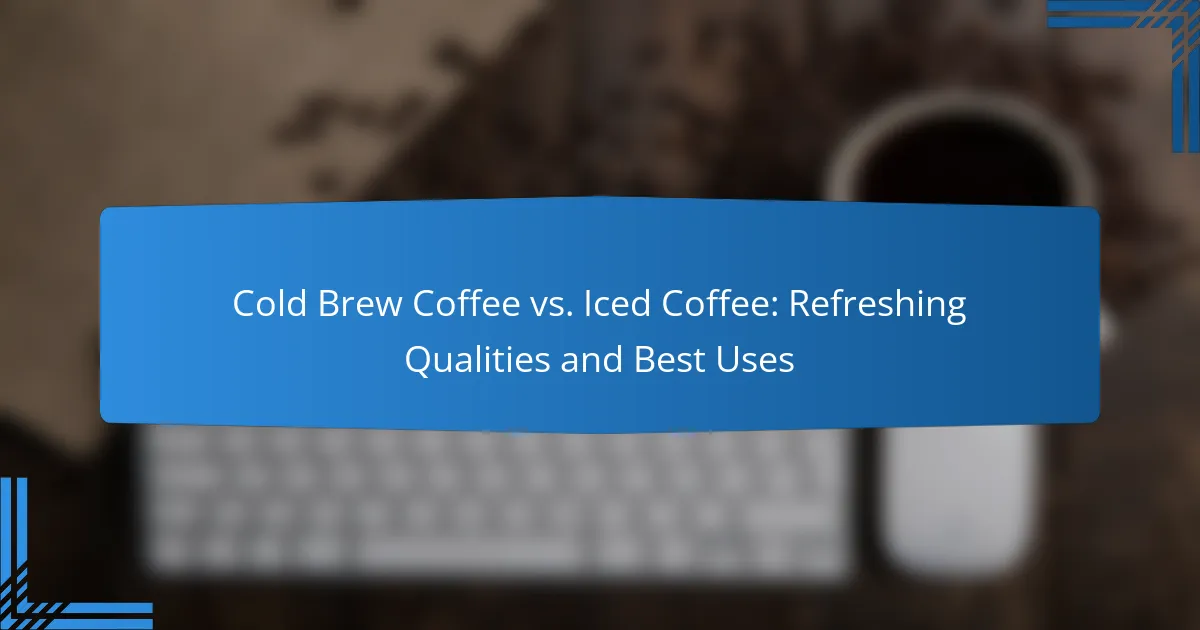Cold brew coffee and iced coffee offer unique refreshing qualities that cater to different preferences and occasions. While cold brew is steeped in cold water for a smooth, less acidic taste, iced coffee is brewed hot and quickly chilled, providing a more immediate caffeine boost. Understanding these differences can help you choose the perfect coffee for your needs, whether you’re seeking a leisurely sip or a quick pick-me-up.

What Are the Key Differences Between Cold Brew Coffee and Iced Coffee?
Cold brew coffee and iced coffee differ primarily in their brewing methods and flavor profiles. Cold brew is made by steeping coarsely ground coffee in cold water for an extended period, while iced coffee is brewed hot and then cooled down. These differences lead to distinct tastes, caffeine levels, and preparation times.
Brewing methods
Cold brew coffee is prepared by steeping coffee grounds in cold or room temperature water for 12 to 24 hours. This slow extraction process results in a smoother, less acidic beverage. In contrast, iced coffee is brewed using hot water, typically through methods like drip brewing or French press, and then cooled by pouring over ice or refrigerating.
Flavor profiles
The flavor of cold brew coffee is often described as rich and mellow, with a natural sweetness and low acidity. This makes it appealing to those who prefer a less bitter taste. Iced coffee, on the other hand, retains more of the traditional coffee flavors, which can include a stronger acidity and bitterness depending on the brewing method and coffee bean used.
Caffeine content
Cold brew coffee generally contains higher caffeine levels compared to iced coffee. This is due to the longer brewing time and the coffee-to-water ratio used, which can be around 1:4 or 1:5. Iced coffee, brewed hot, typically has a lower caffeine concentration, often around 1:15, depending on the brewing technique and serving size.
Serving temperatures
Cold brew coffee is served cold and can be enjoyed straight or with milk and sweeteners. It is often diluted with water or milk to adjust the strength. Iced coffee is served cold as well, but it can be made hot and then chilled, making it versatile for different preferences and seasons.
Preparation time
Cold brew coffee requires a significant time investment, usually taking anywhere from 12 to 24 hours to brew. This makes it less suitable for quick preparation. Iced coffee, however, can be made in a matter of minutes, especially if brewed using methods like pour-over or French press, making it ideal for those seeking a faster option.

When Should You Choose Cold Brew Coffee?
Cold brew coffee is an excellent choice when you want a refreshing beverage with a smooth flavor profile. It is particularly suited for hot weather, offers a less acidic taste, and is favored by coffee enthusiasts looking for a unique brewing method.
Best for hot weather
Cold brew coffee is ideal for hot weather due to its refreshing qualities. The brewing process involves steeping coarsely ground coffee in cold water for an extended period, typically 12 to 24 hours, which results in a chilled beverage that can be served over ice. This makes it a perfect option for summer days when you want to cool down without the heat of traditional brewing methods.
Additionally, cold brew can be prepared in large batches and stored in the refrigerator, allowing you to enjoy a quick, cold coffee drink anytime. This convenience is especially beneficial during heat waves when staying hydrated is essential.
Ideal for smooth taste
Cold brew coffee is known for its smooth, mellow flavor, which is less acidic compared to hot brewed coffee. The cold extraction method minimizes bitterness, making it a great choice for those who prefer a sweeter, more balanced taste. This smoothness can be enhanced by adding milk, cream, or flavored syrups without overwhelming the coffee’s natural flavors.
For those who find hot coffee too harsh, cold brew provides a gentler alternative that can be enjoyed straight or as a base for various coffee drinks. Experimenting with different coffee beans can further enhance the flavor profile, allowing for a personalized experience.
Recommended for coffee enthusiasts
Coffee enthusiasts often gravitate towards cold brew for its unique brewing process and flavor complexity. The extended steeping time allows for a deeper extraction of flavors, which can highlight the nuances of different coffee varieties. This method encourages experimentation with various beans and brewing times to achieve the desired taste.
Moreover, cold brew can be used as a foundation for creative coffee cocktails or blended drinks, appealing to those who enjoy crafting their beverages. Engaging with the cold brew process can deepen your appreciation for coffee and enhance your overall experience.

When Is Iced Coffee the Better Option?
Iced coffee is often the better choice when you need a quick and refreshing caffeine fix. Its rapid preparation and adaptability in flavor make it a popular option for many coffee drinkers.
Quick preparation
Iced coffee can be made in just a few minutes, making it ideal for those in a hurry. Simply brew a hot cup of coffee, pour it over ice, and it’s ready to enjoy. This method allows for immediate gratification without the long steeping time required for cold brew.
For an even faster option, consider using instant coffee. Just mix it with cold water and ice for a quick caffeine boost.
Versatile flavor combinations
Iced coffee offers a wide range of flavor possibilities, allowing you to customize your drink to suit your taste. You can add milk, cream, flavored syrups, or even spices like cinnamon to enhance the flavor profile.
Experimenting with different ingredients can lead to unique combinations, such as vanilla iced coffee or mocha iced coffee, catering to various preferences and occasions.
Accessibility in cafes
Iced coffee is widely available in cafes and coffee shops, making it easy to order on the go. Most establishments offer it on their menu, often with multiple variations to choose from.
This accessibility means you can find iced coffee options regardless of your location, whether you’re in a bustling city or a small town, making it a convenient choice for coffee lovers everywhere.

What Are the Health Benefits of Cold Brew Coffee?
Cold brew coffee offers several health benefits, making it a popular choice among coffee enthusiasts. Its unique brewing process results in a smoother flavor and lower acidity, which can be easier on the stomach for many drinkers.
Lower acidity
One of the primary health benefits of cold brew coffee is its lower acidity compared to traditional hot-brewed coffee. This reduced acidity can help prevent stomach irritation and acid reflux, making it a suitable option for those with sensitive digestive systems.
Cold brew typically has a pH level around 6.0 to 6.5, while regular coffee can range from 4.5 to 5.0. This difference means that cold brew is gentler on the stomach, allowing more people to enjoy coffee without discomfort.
Rich in antioxidants
Cold brew coffee is also rich in antioxidants, which can help combat oxidative stress in the body. Antioxidants are essential for neutralizing free radicals, potentially reducing the risk of chronic diseases.
Research suggests that cold brew may contain higher levels of certain antioxidants compared to hot coffee, making it a beneficial choice for those looking to boost their overall health. Regular consumption can contribute to improved heart health and reduced inflammation.
Hydration benefits
Another advantage of cold brew coffee is its hydration benefits. While coffee is often viewed as a diuretic, cold brew can be less dehydrating due to its lower acidity and smoother flavor, which may encourage more consumption.
Drinking cold brew can contribute to your daily fluid intake, especially during hot weather. Pairing it with water or enjoying it as an afternoon refresher can help maintain hydration levels throughout the day.

What Are the Health Benefits of Iced Coffee?
Iced coffee offers several health benefits, making it a popular choice for many. Its refreshing qualities can enhance metabolism, improve mental alertness, and allow for customizable sugar levels, catering to individual dietary preferences.
Boosts metabolism
Iced coffee can help boost metabolism due to its caffeine content, which may increase energy expenditure. Studies suggest that caffeine can elevate metabolic rates by about 3-11%, depending on individual tolerance and consumption levels. For those looking to manage weight, incorporating iced coffee into a balanced diet may support fat burning when combined with physical activity.
Improves mental alertness
The caffeine in iced coffee is known to enhance mental alertness and improve focus. Consuming a moderate amount, typically around 200-400 mg of caffeine per day, can lead to better cognitive performance and reduced fatigue. This makes iced coffee an excellent choice for those needing a quick mental boost during work or study sessions.
Customizable sugar levels
Iced coffee allows for flexible sugar levels, making it easier to control calorie intake. You can adjust sweetness by using various sweeteners, from sugar to natural alternatives like stevia or monk fruit. This customization is particularly beneficial for individuals monitoring their sugar consumption or those following specific dietary plans, such as low-carb or ketogenic diets.
